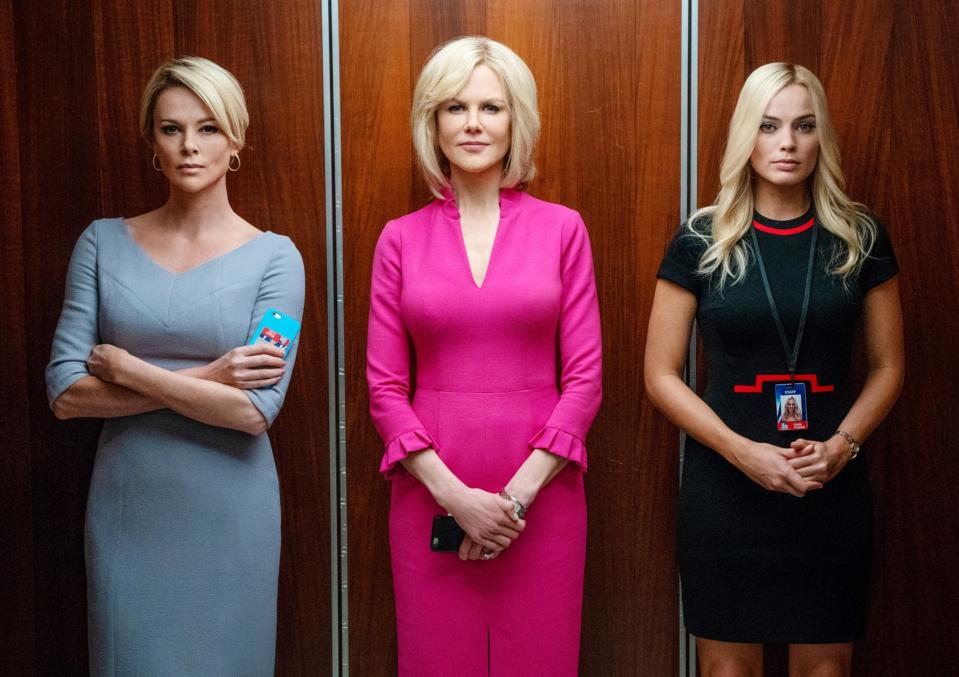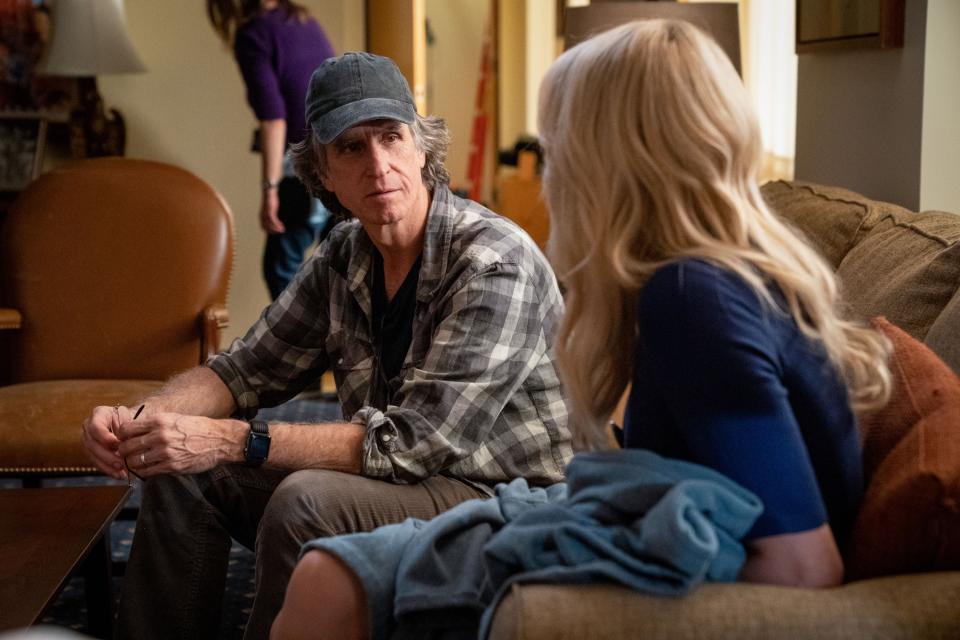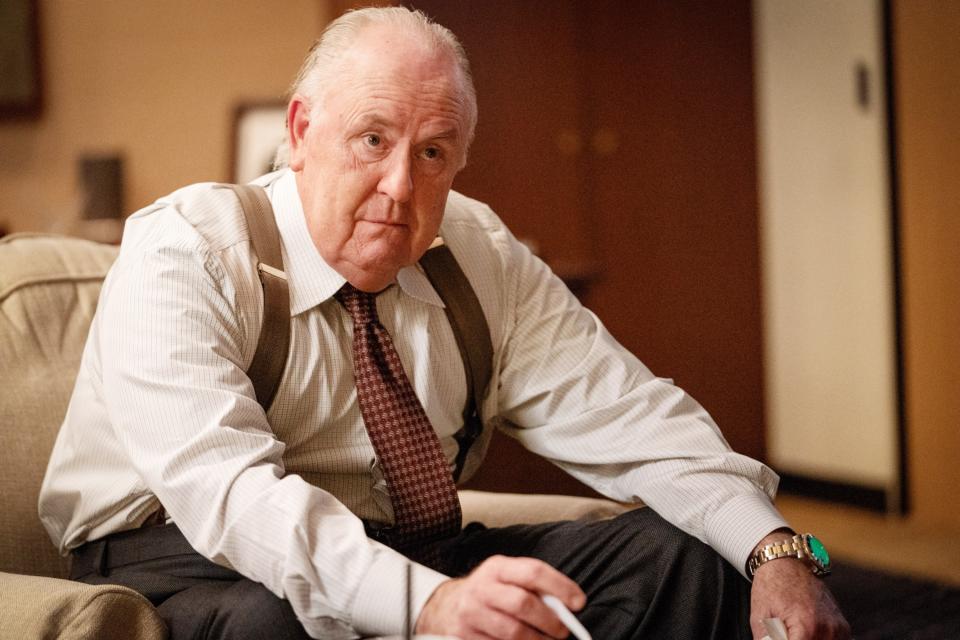Bombshell Director Jay Roach on What He Learned Making a Movie About Fox News
Despite everything we know about Fox News, director Jay Roach—who described himself as "very cynical"—still found himself surprised while making Bombshell. “Once in a while," he told me, "you go, Oh, I might be not cynical enough."
Roach, who first cut his teeth with comedies like Austin Powers and Meet the Parents, has transitioned into heavier political material in recent years. His latest film, Bombshell, goes deep inside the conservative cable-news behemoth during the pressure-cooker days of the Roger Ailes (played by John Lithgow) sexual-harassment scandal. Nicole Kidman plays Gretchen Carlson, the former Fox host who became the first high-profile name to accuse Ailes, while Charlize Theron, her face laden with prosthetics, plays the controversial former Fox host Megyn Kelly. Margot Robbie is a junior staffer named Kayla who represents a composite of women who told their stories of being victimized by Ailes.

MCDBOMB LG005
Here, Roach talked to GQ about growing up in a conservative household, the criticism he’s faced about the movie, and who required the most prosthetics.
GQ: When did you first realize that you wanted to make a movie about Fox News?
Jay Roach: I've always been interested in Fox News because of its place in the world and its influence on the culture. My own family watches quite a bit of Fox News. I don't watch it because I agree with all that much, but I do watch to see how those opinions are expressed and how they clash with the things that I believe in. Trying to understand how they've become so convincing. There's a lot of people who watch Fox News and believe everything they hear, and that's really fascinating to me. To realize, once I got the script, this Roger Ailes–designed institution, at its center, has this very needy, paranoid, egocentric man who requires total loyalty and feels entitled to bully people and even to demand sexual favors. Well, that just makes it all the more compelling as a story. And the overlaps between the politics and the personal, even just the misogyny alone. It is really a very complicated and interesting predicament for the women there.
So you grew up in a conservative household?
Absolutely. I was about 13 when I started learning to debate my dad, who I love very much, but with whom I differ on a lot of issues. And I started to become the black sheep. But again, I was taught by my dad about mutual respect, and about empathy and honesty. My dad was a very masculine man, but he was a loving person too, and he always taught me to respect women. And my mom was really big on mutual respect.
Even the women of Fox News, if you're a left person—I've seen some of the reactions in the press, and I'm surprised by some people who certainly imply that somehow it's a less important story because it's a women's empowerment story, that it's somehow less important because there are women at Fox. And that's a tough thing to face.
Have any of your conservative family members seen Bombshell yet?
My mom watched it and actually really, really liked it. She's not as conservative as my father, but she’s somewhat conservative, and she was really moved by it. So that meant a lot to me.

MCDBOMB LG024
What was the most surprising thing that you learned about Fox while making this?
I didn't know that Fox had a systematic built-in police force. This whole idea of “Team Roger”—almost like a smear campaign's oppositional research outfit in their own publicity wing. If a woman spoke up about the harassment she was experiencing by Roger or Bill O'Reilly, that there would be a concerted effort to investigate her, find ways to attack the credibility, and [even] smear her character.
I read that your set designers had to resort to looking at foot-fetish websites to re-create the set. Did you get any cooperation from Fox at all?
No. Their newsroom had changed by the time we shot the film, but we had contact with a number of people who had worked there during that time. And some of them even slipped [production designer Mark Ricker] photos of their newsrooms, and I got a couple of women to draw the floor plan and furniture layout in Roger's office, the very place where they were abused. And it was just traumatic, hearing them describe this with the trauma in their voice of having to relive it.
Even though you're obviously making a movie and compressing time and using composite characters, that doesn't release you from the obligation to try to get it right in that dramatized way.
In the same vein, the movie uses a ton of prosthetics. You could have easily just cast a bunch of actors who looked like these people and not gone to that extent. Why did you decide to do that?
I think it's related to what I was just saying, that you are advertising the film as “based on a true story.” So you're of course going to try to deliver that experience. We also use a lot of archival footage of the actual people who were part of it. All of that adds up, I think, to the audience being able to just lose themselves in the story. They forget that that's Charlize Theron playing Megyn Kelly.
I always say to the actors, "Listen, I'm not looking for an impersonation. I want this to be a layered performance. Some of that might involve some of you coming through, and don't fear that. I mean, definitely try for a match, but don't try for it so hard that it starts to become a caricature.”
And that's what's great about these actors. They never let it do that. Charlize, especially, was so determined to have it just feel real. But taking it physically as close as she could get helped her feel like she was channeling Megyn. I always let an actor go as far as they want, unless I can't see their face anymore.
Who needed the most time in the makeup chair?
I would say John Lithgow and Charlize are tied at about two and a half hours. Charlize had to do all the transformation and then, on top of that, do the normal beauty makeup that a person who's on camera in a newsroom has to do. So that can be quite time-consuming, even after the prosthetics go on.

MCDBOMB LG008
I wanted to ask you about the Kate McKinnon character, who is a secret lesbian, Hillary-supporting employee of Fox News. Did you actually encounter anyone like that while you were making the movie?
Keep in mind, Fox News is in New York City and Fox News has to hire PAs and video editors and young people out of college, from all walks of life. We know a couple people who had a closeted liberal existence for sure, and of at least one person who also had closeted sexuality. If you just think of the people who live in New York, where there's such a diversity of points of view, and yet once you go into Fox News, you will have to conform to a look, a way of talking about yourself, and if you don't have much power—as the Kate McKinnon character definitely doesn't—you will have to keep it a secret.
To me, that character was really important to our lefty audience who would come and see this: “You may think everyone in Fox conforms. Roger Ailes tried to run it like a cult, with that kind of loyalty and that kind of programming and everybody conforming to the look he required, but he did not succeed in turning them all into matching clones.” I do love, love, love that scene with Kate and Margot [Robbie] in bed, where [Margot] says, "Why do you even work here?" And [Kate] says, "Oh, I think I thrive in toxic environments,” and then she says, "I tried to work at a bunch of places, but this is the job I could get." By the way, a lot of people who are in other networks now, [they] started at Fox.
Now that you bring that up, I also remember when Roger Ailes died and people were surprised because Rachel Maddow said something about how he was a friend and a mentor.
I didn't realize that. When you see how Megyn Kelly describes, both in her book and now in our film, that for ten years after [Roger] harassed her, she continued to work there and continued to get advice from him and he promoted her. It's a very complicated, maybe Stockholm Syndrome–type experience that some women have to go through.
Like you said before, some people think that you may have been too sympathetic to the characters. Which I think is just a main challenge of making a movie like this, where the characters are so controversial but have also gone through something so difficult. How did you work to walk that line during filming, and in hindsight would you have done anything differently after seeing the criticism?
Yeah, that criticism is interesting. Listen, I really believe that sexual harassment is a completely nonpartisan issue and that it is one of the reasons I made the film, and one of the things I said to Charlize right off is that I have a lot of family members who watch Fox News who probably wouldn't tune in to what was called a “female empowerment story.” But this is a story about women they know, and they might pay attention to it. If you also noticed, "Hey, what they're going through is a pretty universal problem," then why is it less important that it happened at Fox, if women are being abused?
And then you look at the risks they took. Like Gretchen Carlson jumped off a cliff a year before Harvey Weinstein—had no hope of some giant public support system. I'm disappointed that we didn't make the case strongly enough that that shouldn't matter. In this case, what they faced, the horror-film scenario, that was a common part of these women's experiences. I guess I just hoped that you would say, "Oh, okay, well, whoever she is and wherever she works, I want to see how she dealt with that and how she took down this incredibly powerful man a year before it became a little easier to do so."
It's one way to get a foot in the door, so to speak!
Originally Appeared on GQ


